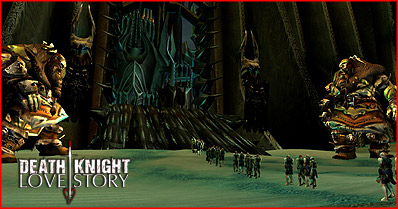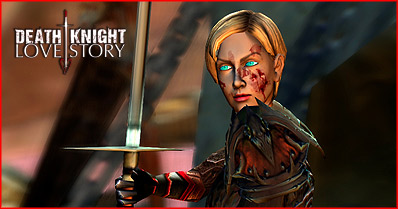In 2006, I woke up in the ICU, blood pouring down one arm from a line the doctor was desperately trying to get in my arm. He was down on one knee, like he was going to propose, my arm flung out in front of him.
"I'm sorry," he said, "I'm sorry. I'm sorry."
He kept saying it. Over and over. My girlfriend stood next to me, gripping my hand. I was in intense pain, but even so, couldn't understand why he kept apologizing. My brain was a muddled gray mush, but I understood this much:
The pain was necessary. Expected.
They needed to get a line in me, you see, because I was dying.
And I knew it.
#
I read a lot of dark books. I'm a fan of the weird, the creepy, the strange. I have a fondness for Jeff VanderMeer and KJ Bishop and Angela Carter. I read Lovecraft only until it started to give me active nightmares. I've read everything by Christopher Priest, including the certainly not at all upbeat Fugue for a Darkening Island. I devoured Melvin Burgess's Bloodtide and Bloodsong like milky honey.
As a teen, I had people try and get me to read Terry Pratchett and Piers Anthony, but it just never took. I was getting something out of dark fiction, some catharsis, that I wasn't getting from other books with lots of laughs or tidy, upbeat endings.
How can you read all that stuff? People would ask me.
Life is fucking depressing enough.
But that was why I read it.
#
When I get laid off from my job in Chicago, six months after the ICU trip, I don't have any savings. No safety net. Because of U.S. health insurance laws at the time, I have to continue paying for health insurance or risk becoming uninsurable even under an employer plan. Health insurance costs me $800 a month and doesn't actually pay for a dime of the $500 a month that my new medication costs.
Chronic illness is like getting hammered upside the head with a shovel. They tell me it's an immune disorder, and there's nothing I could have done to prevent it. So sorry for you. Too bad. Could be worse. There are worse illnesses.
But now it costs me $500 a month in meds just to keep on living. Plus the $800 for the useless insurance. Plus $550 a month in rent. I'm making $320 a week in unemployment. And I've still got thousands in medical debt from the ICU visit.
In the comments of a recent Guardian article I'm quoted in, somebody tells me I'm bad at math.
Yeah, well. I was good enough then to know this wasn't going to work.
Death had never felt so close.
#
Life is dark, sometimes.
The trouble is, when you're pressed face-first into shit, all you can think about is trying to stay alive. It's all you do, when you're really desperate - you try and live. There's no time to emote, no time to figure it out, no time to sit on the bed and cry and feel sorry for yourself. When you're faced with your own problems, real, tangible I-could-fucking-die problems, you have to deal with them.
But a fictional problem?
Somebody else is dealing with that. You're just along for the ride.
It means you get to spend the whole ride actually feeling things, instead of buttoning it all back up so you can live.
This is the story of my life: getting called a monster because I do instead of feel, because I act instead of emote.
#
My week back at the house after the ICU visit, I saw blood every time I closed my eyes. My arms were filled with needle marks, covered in bruises. The pain was so bad, and I was so weak, I couldn't even prepare my own meals - I didn't have the strength to wield a knife.
I'd lost a tremendous amount of weight the last year, and more in the ICU. It was like I lived in someone else's body. I felt disconnected.
At night, I'd lie in bed, and when I closed my eyes I'd jerk awake again, haunted by sounds and smells and that blood, that blood gushing from my arm, pooling on the floor. I could smell the hospital antiseptic.
My week in the hospital, I was hooked up with a catheter. They stuck me with needles every three hours, and took blood four times a day. My period started. The catheter leaked. I got thrush, and couldn't eat, couldn't swallow. I spent a day lying in my own blood and urine. At one point an orderly threw a wet towel at me and told me to wash myself.
The memories of that horrible week came back every time I closed my eyes.
But I couldn't process what had happened to me, or how my life had changed now that I was totally reliant on medication for the rest of my life. I had thousands of dollars in medical bills. Rent had to be paid. I had to get back to work. I didn't have enough PTO time to miss work. I had to get back to work. Had to get back to living.
Gotta go. Gotta move.
I pretended I wasn't broken, because if I let myself be broken, I wasn't going to make it.
#
I'm not actually sure when I started writing dark fiction. I know I started writing GOD'S WAR the year I was dying. I was losing a lot of weight and drinking a lot of water, but nobody could figure out what was wrong with me.
It certainly started out as a dark little book; a war-weary world, a world-weary protagonist. But after I got back from the hospital, after I started measuring out my life in medication, something changed.
Because I realized something then, looking at all the medical bullshit keeping me alive:
Every life is a tragedy.
We are all going to die.
There is no other ending, no matter the choices you make.
There was some relief in that.
#
My first hospital visit after getting out of the ICU, I walked into the hospital bathroom and had a panic attack.
It was the strangest thing. One minute, I'm totally fine. I'm cool and collected. I'm just seeing my doctor, to deal with this bullshit illness.
But when I went into the bathroom and washed my hands, I smelled it: the antiseptic soap.
I'd first smelled it in the ICU, during that bloody horror show of a week.
I started to shake.
I went back into the bathroom stall and sat down. I burst into tears.
No reason.
Just the smell. The panic.
I'd been a body on a slab; a thing, subhuman.
Wash yourself.
#
I just finished playing a game called Mass Effect 3, the third in the Mass Effect franchise, naturally. It has a really contentious ending. The galaxy is being destroyed by an evil alien force, so of course your mission is to stop it.
But it's clear from the opening scene that you're basically fucked.
No matter what you choose, you're fucked.
I knew this from the very start. Right from the opening. I saw what was coming. I saw we were all fucked. And I played that game faster than any game I've ever played, because I could feel the urgency - yes, we're all fucked, but we're going to save the galaxy. I'm going to get there. I'm going to save it.
It's a relentlessly dark game, but it's just a game, right?
Yet I found myself playing this game and crying the whole way through it. I cried through the whole ending, because I knew. I knew from the very beginning. I knew how it would end.
We're all going to die.
But it was different, when I played the game. When I played it through in the game, it wasn't like in real life, when I had to keep moving, I had to keep sucking air; gotta find a job, figure out how to pay insurance bills, pack up my shit, move to a new place....
When I played the game, it was the character taking all these hits. It was the character who was letting people down. It was the character who had to keep moving.
And that freed me up to actually feel something.
I could actually roll through all those terrible emotions - the broken despair, the horror, the fear, the rage, the sorrow. I didn't have to muscle through. I could spend 40 hours of game time emoting, and not feel bad about it. It was emotion without weakness, catharsis without giving in to a real-world threat.
When I got to the end of the game, it was perfect, for me.
Because I knew from the start we were all going to die.
The challenge was having the fortitude to keep going when you knew you were going to die, when you knew it was all going to end.
For the character. For the fake galaxy.
For me, eventually.
And all of us.
#
I'm not sure where I picked up this relentless way of muscling through things without stopping to process them. I think it's a survival thing. My mom does this too, during times of great stress. The whole world bleeds away, and I get this laser focus. It means I'm incredibly good during times of fear and panic and crazy, but it can be days or weeks before I actually bust down and process what happened.
Reading tragedies, I realized, connecting with characters who persevered in the face of grim odds, and certain ends - were actually comfort reading for me. They put me into high-stress situations with no personal stakes, so I could actually feel the fear and discomfort and rage and horror without having any skin in the game.
Dark fiction didn't depress me - it invigorated me. So when folks talked to me about my work, or the books I read, and said they were downers, there was always a big disconnect. I understood why they would like upbeat endings, all neat and tidy, because real life wasn't like that, and they wanted something more hopeful.
But I felt plenty of hope all the time. It was the hope that kept me going.
I read because I needed to feel the other things without losing my shit and giving up.
Tragedies are, at their core, stand-ins for life itself. We all know how this little jaunt is going to end. We all know we're going to die. But we stick with it anyway. We persevere. We survive for just a little longer. Just a little bit longer, even knowing the end.
I do find real courage in that. There's a good story in that. And it's people who understand the end and get up again that I'm most interested in telling stories about, because people who take the hits and keep getting up inspire me to do it, too. If they can endure all that crap and get up again, well, hey, chronic illness and unemployment and bad relationships and poverty aren't so bad.
I did get up, eventually, I get up every time. Things got better.
But I know it won't always be sun and roses. I know the dark stuff is there - in my past, in my future. It bubbles up sometimes.
It's funny, though, because when it bubbles up I don't face it down, then: there are bills to pay, and posts to write. I face all that horror and fear on the page, instead. In safe stories about fake people's tragedies.
Tragedy is my comfort fiction, and I'm OK with that.





